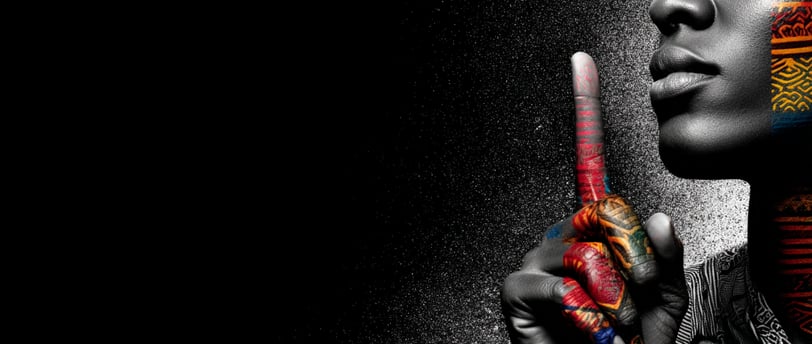Digital Respectability Politics: How 'Proper' Online Behavior Erases Cultural Identity
Digital respectability politics often masks cultural erasure. Discover how Western communication standards force assimilation, why voice notes represent resistance, and how to reclaim your authentic digital identity.
Kwame Otieno Bala
5/8/20254 min read


Decolonizing Our Spaces Series
That workshop teaching your grandmother the "right way" to use WhatsApp isn't education, it's erasure. The most radical act might be letting her send those 15-minute voice notes after all.
You've seen it happen. Maybe you've even caught yourself doing it:
"No, Mom, that's not how you're supposed to use Instagram."
"Dad, voice notes should be short. Just type it out."
"Auntie, you don't need to ask about someone's family before every work message."
Let's call this what it is: digital respectability politics. It's colonization dressed up as helpfulness, and we need to talk about it.
When "Helping" Becomes Erasing
My father recently called me, frustrated after attending a "digital literacy" workshop where the instructor spent 30 minutes teaching elders to restrict their voice notes to under one minute, replace voice with text whenever possible, and avoid "cluttering" group chats with greetings.
"They're teaching us to communicate like robots," he said.
He was right. These elders weren't gaining digital literacy, they were being stripped of cultural communication practices refined over centuries. The rich contextual information, relationship maintenance, and communal knowledge-building central to their communication was being sacrificed at the altar of Western "efficiency."
The instructor beamed with pride when one elder sent a clipped, context-free text message instead of her usual voice greeting. What was celebrated as "progress" was actually something much darker: the successful erasure of cultural communication patterns.
And we're all complicit in this.
The Digital Trap
Have you ever:
Cringed at a family member's "unprofessional" email?
Edited a colleague's LinkedIn profile to make it more "proper"?
Suggested someone make their communication more "efficient"?
Congratulations! You've become an enforcer of digital respectability politics.
I've done it too. I once told my uncle his professional emails were "too personal" before realizing I was asking him to erase his cultural identity to appease Western corporate standards.
Digital respectability politics follows the same playbook as its offline counterpart: it promises that if you just behave according to the dominant culture's standards, you'll be accepted and successful.
But here's the trap: the standards are both arbitrary and moving targets. They're designed not to include but to exclude.
The Hidden Violence of "Proper" Digital Communication
Want to see the damage in real time? Watch what happens when we pressure people to abandon their natural communication patterns:
Knowledge gets lost. Those "rambling" voice notes often contain embedded cultural knowledge that doesn't survive translation to "efficient" text.
Relationships weaken. When your aunt can't ask about your family before discussing business, crucial social bonds start to fray.
Identity erodes. Every time someone code-switches into "proper" digital communication, they lose another space where cultural expression thrives.
Innovation dies. Those "inefficient" communication patterns might actually solve problems Silicon Valley hasn't even recognized yet.
This isn't abstract. It's happening right now, in your family WhatsApp groups, in your workplace Slack channels, in every digital space where someone is being told their cultural communication style is "unprofessional."
The Business of Digital Whitewashing
Did you know there's an entire industry built around teaching people to communicate "properly" online?
From LinkedIn profile optimization services to email etiquette courses to digital literacy programs, many explicitly target Global South communities with the promise of teaching "professional" digital behavior.
Their business model? Selling digital whitewashing!
The unspoken pitch is disturbing: "Pay us to help you erase the markers of your cultural identity so you can be taken seriously by Western platforms and employers."
It's the digital equivalent of skin-lightening cream, a product that simultaneously exploits and deepens cultural insecurities while reinforcing harmful hierarchies.
And we're buying it.
The Radical Act of Digital Authenticity
So what do we do? How do we resist?
Start here: Stop apologizing for your cultural communication patterns. Stop "correcting" others.
I now celebrate when:
My uncle sends 12-minute voice notes detailing family histories
My colleagues include relationship-building preambles in work emails
My community transforms LinkedIn from resume repository to storytelling platform
My team uses WhatsApp groups in circular rather than linear communication patterns
These aren't failures to understand "proper" digital behavior. They're refusals to accept Western communication norms as universal. They're acts of digital sovereignty.
The most powerful resistance isn't abandoning digital spaces, it's refusing to abandon your cultural communication patterns within them.
Digital Noise, Stoic Silence
As Musonius Rufus once taught, “To live according to nature is to live in accordance with reason.” But what if reason itself has been colonized? What if the ‘proper’ becomes so polished, it forgets the pulse beneath it?
Stoicism isn’t about stripping emotion—it’s about choosing your expression. It teaches us to pause before we perform, to anchor our voice in values, not algorithms.
When my grandmother sends a 10-minute voice note, she isn’t being inefficient—she’s being intentional. She’s choosing presence over polish. And that’s Stoic.
Digital respectability demands speed. Stoicism invites stillness.
So the next time you’re tempted to optimize your communication into silence, remember this: true freedom is not the ability to speak like them—it’s the ability to speak like yourself, without shame.
The Myth You've Been Sold
Here's the lie: There is a universal standard of "professional" digital communication.
The truth? What's defined as "professional" online is entirely culturally constructed, yet presented as neutral and universal. This supposed neutrality is the perfect cover for cultural imperialism.
The next time someone offers to teach your community the "proper" way to use digital platforms, ask:
Who defined "proper"?
What cultural values does this "proper" behavior reflect?
What knowledge systems are being erased?
Who benefits from this standardization?
Take Back Your Digital Identity
Here's your action plan:
Reclaim your communication patterns. Send that voice note. Add those relationship questions to your work email. Your cultural communication patterns aren't wrong, they're different, and often better.
Question the defaults. When someone says "this is how you're supposed to use this platform," ask "according to whom?"
Celebrate digital resistance. When you see someone using platforms in culturally authentic ways, amplify them.
Demand better platforms. Support technologies built for diverse communication patterns, not just Western defaults.
Redefine digital literacy. True digital literacy isn't about conforming to platform norms, it's about maintaining cultural integrity while navigating digital spaces.
The next time you catch yourself about to "correct" someone's digital behavior, stop and ask whether you're teaching digital literacy or enforcing digital colonization.
Your grandmother's "improper" WhatsApp use isn't failure, it's resistance. And maybe we should all be taking notes instead of trying to correct her.
